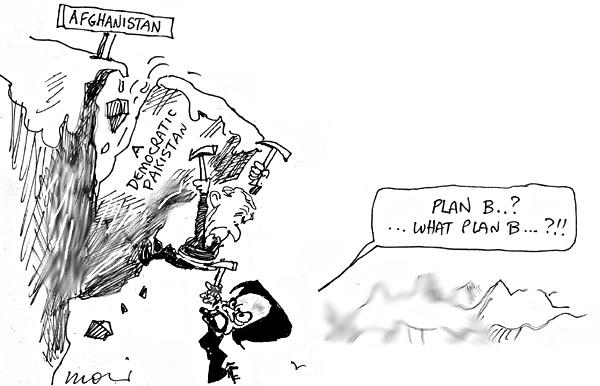Search
Democracy Links
Member's Off-site Blogs
the rules of the game ....

The reason the United States gave for invading Afghanistan in October 2001 was "to destroy the infrastructure of al-Qaeda, the perpetrators of 9/11".
The women of Rawa say this is false.
In a rare statement on 4 December that went unreported in Britain, they said: "By experience, [we have found] that the US does not want to defeat the Taliban and al-Qaeda, because then they will have no excuse to stay in Afghanistan and work towards the realisation of their economic, political and strategic interests in the region."
The truth about the "good war" is to be found in compelling evidence that the 2001 invasion, widely supported in the west as a justifiable response to the 11 September attacks, was actually planned two months prior to 9/11 and that the most pressing problem for Washington was not the Taliban's links with Osama Bin Laden, but the prospect of the Taliban mullahs losing control of Afghanistan to less reliable mujahedin factions, led by warlords who had been funded and armed by the CIA to fight America's proxy war against the Soviet occupiers in the 1980s.
Known as the Northern Alliance, these mujahedin had been largely a creation of Washington, which believed the "jihadi card" could be used to bring down the Soviet Union. The Taliban were a product of this and, during the Clinton years, they were admired for their "discipline". Or, as the Wall Street Journal put it, "[the Taliban] are the players most capable of achieving peace in Afghanistan at this moment in history".
The "moment in history" was a secret memorandum of understanding the mullahs had signed with the Clinton administration on the pipeline deal. However, by the late 1990s, the Northern Alliance had encroached further and further on territory controlled by the Taliban, whom, as a result, were deemed in Washington to lack the "stability" required of such an important client. It was the consistency of this client relationship that had been a prerequisite of US support, regardless of the Taliban's aversion to human rights. (Asked about this, a state department briefer had predicted that "the Taliban will develop like the Saudis did", with a pro-American economy, no democracy and "lots of sharia law", which meant the legalised persecution of women. "We can live with that," he said.)
By early 2001, convinced it was the presence of Osama Bin Laden that was souring their relationship with Washington, the Taliban tried to get rid of him. Under a deal negotiated by the leaders of Pakistan's two Islamic parties, Bin Laden was to be held under house arrest in Peshawar. A tribunal of clerics would then hear evidence against him and decide whether to try him or hand him over to the Americans.
Whether or not this would have happened, Pakistan's Pervez Musharraf vetoed the plan. According to the then Pakistani foreign minister, Niaz Naik, a senior US diplomat told him on 21 July 2001 that it had been decided to dispense with the Taliban "under a carpet of bombs".
Acclaimed as the first "victory" in the "war on terror", the attack on Afghanistan in October 2001 and its ripple effect caused the deaths of thousands of civilians who, even more than Iraqis, remain invisible to western eyes.
The family of Gulam Rasul is typical. It was 7.45am on 21 October. The headmaster of a school in the town of Khair Khana, Rasul had just finished eating breakfast with his family and had walked outside to chat to a neighbour. Inside the house were his wife, Shiekra, his four sons, aged three to ten, his brother and his wife, his sister and her husband. He looked up to see an aircraft weaving in the sky, then his house exploded in a fireball behind him. Nine people died in this attack by a US F-16 dropping a 500lb bomb. The only survivor was his nine-year-old son, Ahmad Bilal. "Most of the people killed in this war are not Taliban; they are innocents," Gulam Rasul told me. "Was the killing of my family a mistake? No, it was not. They fly their planes and look down on us, the mere Afghan people, who have no planes, and they bomb us for our birthright, and with all contempt."- By John Richardson at 12 Jan 2008 - 6:02pm
- John Richardson's blog
- Login or register to post comments
Recent comments
9 hours 24 min ago
10 hours 8 min ago
10 hours 27 min ago
10 hours 35 min ago
10 hours 45 min ago
12 hours 53 min ago
13 hours 32 min ago
15 hours 44 min ago
17 hours 32 min ago
21 hours 44 min ago